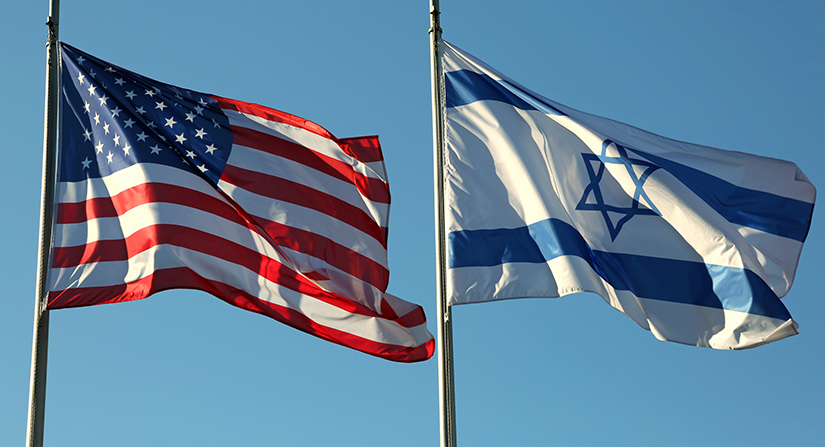The Israel-Hamas War that began on October 7, 2023, is still continuing with no end in sight. Over 150 Israelis remain hostages as of December 2023 while Israel intensifies its military offensive in southern Gaza. Civilian casualties continue to mount, with reports citing more than 17,700 dead, mostly women and children, as of December 10.[1]
The armed conflict is a humanitarian tragedy, and the international community must urgently press for a two-state solution, presenting to both Palestine and Israel a roadmap to a peaceful and secure coexistence. In the following, I provide an overview of what the international community should prioritize in seeking a two-state solution and the role Japan can play toward this goal.

No Resolution in Sight
Israel is said to be intent on killing Hamas leader Yahya Sinwar with its military operations, but there are also reports that it is looking for some arrangement that could eventually lead to a resolution of the conflict.[2] At this point, though, it has not indicated any intention of bringing the war to a halt.
Even if Israel can work out such an arrangement or concludes that it has sufficiently destroyed or weakened the militants in Gaza to halt its offensive, Israel and Hamas will likely remain in a state of war. This is because fundamental issues between Israel and Palestine will not have been resolved. Israel is seeking guarantees for its security and survival as a state, while Palestine is pursuing assurances for the security and dignity of the people of Gaza and the West Bank and the creation of a Palestinian state.
The only way to end the Israel-Hamas War and achieve lasting peace and stability in the Palestinian territories and Israel is for all parties to share a postwar regional vision and work together to prevent a recurrence of a tragedy like the October 7 attacks. The basis for such a vision must be a two-state solution, as pursued during the mainly US-mediated Middle East peace talks leading to the Oslo Accords and the Israel-Jordan peace treaty.
Palestinian self-determination, established under the first Oslo Accord of 1993, has been splintered since 2006, with the Palestinian Authority governing the West Bank and Hamas controlling Gaza. Subsequent Israeli administrations have rejected any concessions to the Palestinians, moreover, seeking to isolate Gaza and the West Bank by building barriers and to maintain security in the West Bank by expanding settlements there. Efforts toward a two-state solution have languished, but the latest war has made clear to both sides that the conflict can never be resolved under the status quo.
Only Washington Can Pressure Israel
The only country with any chance of persuading Israel to negotiate a two-state solution is the United States. Israel has been surrounded by hostile neighbors since its creation in 1948; it has fought four Arab-Israeli Wars over the past 75 years, in addition to clashing with the Palestine Liberation Organization, the Hezbollah militant group of Lebanon, and Hamas. The October 7 attack, in which Hamas fighters killed more than 1,200 people and seized over 240 hostages, was the biggest breach of territory and loss of life since Israel’s founding. The assault has been seen as a threat to the very survival of the state that requires a response to eliminate this threat at any cost. The eradication of Hamas in Gaza is thus Israel’s top priority, no matter how strongly it is condemned by the international community for retaliatory strikes that have caused a humanitarian crisis and the deaths of countless Palestinian civilians.
It was in this context in late November that the United States helped broker a pause to the conflict and the release of hostages held by Hamas in exchange for Palestinian prisoners. This was a temporary halt in hostilities, not a ceasefire, but historically it has been when Washington intervened that Israel has moved toward peace, such as during the Second Arab-Israeli War, the negotiations for and conclusion of the Camp David Accords between Israel and Egypt, and the peace negotiations following the Gulf War. US engagement in the region has waned since the turn of the century, owing to domestic development of shale gas and oil—resulting in reduced dependence on the Middle East for fossil fuels—and its rebalancing toward Asia in response to the rise of China. But the Israel-Hamas War has changed this dynamic; Washington has issued warnings to Iran and deployed an aircraft carrier strike group to the Mediterranean Sea, Red Sea, and Indian Ocean to enhance its regional presence and prevent the war from spreading beyond Palestine. While maintaining its stance of supporting Israel’s right to self-defense, it has demanded that Israel take humanitarian measures for both Israeli and Gaza civilians. The result was the temporary truce.
On December 12, President Joe Biden openly criticized Israeli Prime Minister Benjamin Netanyahu’s handling of the war, saying that Israel is starting to lose international support due to its “indiscriminate bombing” of Gaza and its rejection of peace through a two-state solution.[3]US engagement is indispensable to any international effort to negotiate the details of and a roadmap toward a two-state solution with Israel and Palestine.

The International Community's Call for a Two-State Solution
With there being almost no possibility of a negotiated compromise to the armed conflict, there is a growing international chorus calling for a two-state solution.
King Abdullah II of Jordan, in a November 14 opinion published in the Washington Post, noted that priority should be given to a “concerted international effort to develop a regional architecture of peace, security, and prosperity, built on a Palestinian-Israeli peace based on the two-state solution. . . . It is up to responsible leaders to deliver results, starting now. That work will not be easy, but it is imperative. There is no victory in the carnage that has been unfolding. No one will prevail unless the Palestinians are given their rights and their state. Only this will be a true victory for peace, for Palestinians and for Israelis alike. And that, more than anything, would be a victory for our common humanity.[4]
And in his November 28 column in the New York Times, Thomas Friedman explained that there are three wars going on at the same time in the Hamas-Israel War: “a war between Israeli Jews and the Palestinians exacerbated by a terrorist group, a war within Israeli and Palestinian societies over the future, and a war between Iran and its proxies and America and its allies. . . . A revamped Palestinian Authority is the keystone for reviving a two-state solution . . . [and] for creating a stable foundation for the normalization of relations between Israel and Saudi Arabia and the wider Arab Muslim world. And it is the keystone for creating an alliance among Israel, moderate Arabs, the United States, and NATO that can weaken Iran and its proxies Hamas, Hezbollah and the Houthis.”[5]
The Economist went further, seeing October 7 as a turning point that offered a chance to find new leaders with a new vision: “In Israel Binyamin Netanyahu is an obstacle to a genuine reconciliation, the sooner he goes the better. America could usefully signal that it expects Israel to hold elections soon. . . . New Palestinian leadership is needed, too. Hamas is an avowed enemy of peace . . . Mahmoud Abbas, who runs the Palestinian Authority (PA), is corrupt, ossified and lacks any democratic legitimacy. . . . Moderate Arab countries should sponsor a transitional Palestinian leadership for the West Bank and Gaza that can begin building trust among its own people and, vitally, with the Israelis, before holding elections.”[6] Only when both sides truly believe in peace will a two-state solution become viable.
“The key,” the Economist continued, “is early pressure exerted by America and Saudi Arabia on Israel and the Palestinians. The PA argues that peace could be kick-started if America and the European Union sent Israel a signal by recognising a Palestinian state upfront. . . . America should fulfil its promise to open a diplomatic mission for the Palestinians in Jerusalem. But full recognition of Palestine by the West and of Israel by Saudi Arabia should be held out as rewards for the future, as an incentive for progress.”
The views of the international community regarding a two-state solution can be summed up as follows:
- 1. The United States, Europe, and moderate Arab states see the two-state solution as being the basis of the path to peace.
- 2. Both Israel and Palestine need a new leader.
- 3. The United States and moderate Arab countries (such as Saudi Arabia and those that have diplomatic relations with Israel, including Egypt, Jordan, the United Arab Emirates, and Bahrain) should pressure both Israel (to hold early national elections) and Palestine (to establish a transitional Palestinian leadership for the West Bank and Gaza)
- 4. New leaders must keep in check the far right in Israel and drive out Hamas and corrupt officials in Palestine.
- 5. The United States, Europe, moderate Arab states, and the international community, including Japan, must work together to prevent Iran and allied groups, as well as Russia, from sowing chaos and strife.

The Role Japan Can Play
Since joining the multilateral negotiations launched in January 1992, Japan has been supporting the Middle East peace process directly in partnership and cooperation with other countries, offering broad economic, social, and cultural assistance toward Palestinian self-rule. The fundamental premise of such support is the pursuit of a two-state solution.
I have been directly involved in promoting regional cooperation and providing assistance to Palestine through such multilateral working groups as those for the environment and economic development, first as the Japanese government official in charge of the above multilateral negotiations and, from March 1993, as deputy director of the First Middle East Division of the Ministry of Foreign Affairs. And I have witnessed firsthand how Japan’s assistance for social and economic development helped build confidence in driving the negotiations forward.
Indeed, then US Secretary of State Warren Christopher expressed his gratitude to then Foreign Minister Yohei Kono for the contributions by the Japanese delegation to the talks, led by Toshinori Shigeie, Deputy Director-General of the Middle Eastern and African Affairs Bureau. The key to successful political negotiations is an environment conducive to agreement, and a crucial factor in creating such an environment is for the participants to trust and have confidence in one another. Japan’s assistance helped to focus the attention of both sides to people’s actual living conditions and their economic and social environment and thus to create pathways to concrete forms of cooperation. There should be no reason why Japan cannot play a similar role today.
Japan should actively engage in the Middle East, working with the United States, Europe, and moderate Arab states to achieve a solution in keeping with the views described in 1 to 5 above. Given the widespread destruction of civilian life Gaza, Japan should first provide residents with broad and substantial humanitarian aid. It should then make concrete proposals demonstrating how their lives and communities can be rebuilt once peace is achieved. Japan has been providing assistance to Palestinians in both the West Bank and Gaza over the past 30 years, and it continues to implement the Corridor for Peace and Prosperity initiative today. I believe that Japan can and should take the lead in providing humanitarian and reconstruction assistance to Gaza, providing the kind support that will be crucial in steering the peace negotiations to a successful agreement.
(2024/02/28)
Notes
- 1 “Gaza Chiku de sento tsuzuku” (Fighting Continues in the Gaza Strip), TBS News Dig, December 10, 2023.
- 2 “Isuraeru: Hamasu no Gaza Chiku toppu satsugai ga gunji-sakusen no mokuhyo” (Killing of Hamas Gaza Leader Is Goal of Military Operation), NHK, December 11, 2023.
- 3 “Baiden Daitoryo: Isuraeru wa sekai de shiji o ushinai tsutsu aru” (President Biden: Israel Is Losing International Support), NHK, December 13, 2023.
- 4 King Abdullah II, “Opinion: King of Jordan: A Two-State Solution Would Be a Victory for Our Common Humanity,” Washington Post, November 14, 2023.
- 5 Thomas L. Friedman, “Understanding the True Nature of the Hamas-Israel War,” New York Times, November 28, 2023.
- 6 “Israel and Palestine: How peace is possible,” Economist, December 7, 2023.

